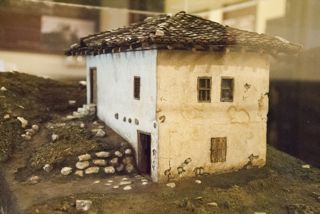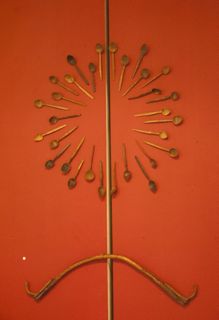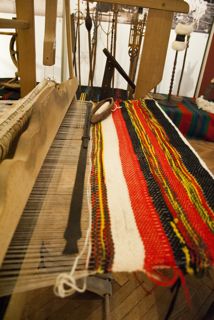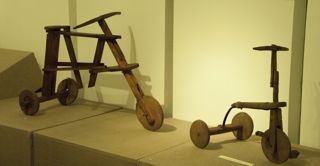I would not dare to determine what is "Greek" in Bulgarian culture and vice versa, namely what is "Bulgarian" in Greek culture. During centuries of coexistence in the Balkans the two neighbouring cultures had influenced each other and I think that it is more interesting to learn how they looked at each other, how they evaluated each other within the different historical and political contexts. As I have said, ethnologists find it more relevant to study how the bearers of specific culture define certain elements of it as "their own" and others as "foreign". In this respect, the comparison between Bulgaria and Greece stands out in the family and community memory in the Bulgarian Black Sea cities. As is known, Sozopol, Nesebar, Pomorie (formerly Anchialo) were founded as ancient Greek colonies. A compact but sparse Greek population inhabited them which, over  time, had declined due to the pressure from the Bulgarian state. During the field work in these cities in 2004, 2005 and 2006, my colleagues from the Ethnographic Institute with Museum and I met with some of the descendants of the local Greeks. Both communities (the descendants of the local Greeks and the descendants of the Bulgarian refugees who settled in these cities after World War I) pointed out the marriage pattern of Bulgarians and Greeks as a significant cultural difference. In the Bulgarian pattern, the woman would go to her husband’s house, thus becoming a daughter-in-law whereas it was the opposite in Greece, as the man would go to his wife’s house, thus becoming a son-in-law. The other differences involve the distribution of labour in the family, the means of living, the urban appearance of the clothing and the arrangement in the Greek houses as opposed to the peasant dresses and the poverty in the Sharon houses of the Bulgarian farmers. These differences impressed the two communities when they met in the 1920s and today’s inhabitants of these cities have preserved them as memories.
time, had declined due to the pressure from the Bulgarian state. During the field work in these cities in 2004, 2005 and 2006, my colleagues from the Ethnographic Institute with Museum and I met with some of the descendants of the local Greeks. Both communities (the descendants of the local Greeks and the descendants of the Bulgarian refugees who settled in these cities after World War I) pointed out the marriage pattern of Bulgarians and Greeks as a significant cultural difference. In the Bulgarian pattern, the woman would go to her husband’s house, thus becoming a daughter-in-law whereas it was the opposite in Greece, as the man would go to his wife’s house, thus becoming a son-in-law. The other differences involve the distribution of labour in the family, the means of living, the urban appearance of the clothing and the arrangement in the Greek houses as opposed to the peasant dresses and the poverty in the Sharon houses of the Bulgarian farmers. These differences impressed the two communities when they met in the 1920s and today’s inhabitants of these cities have preserved them as memories.
 Do you think that the contemporary social and political processes in Bulgaria and Greece have something in common?
Do you think that the contemporary social and political processes in Bulgaria and Greece have something in common?
Although Greece does not have the Bulgarian experience in terms of state socialism in the Soviet model after World War I, it seems that the two neighbouring countries are increasingly converging in response to the global economic crisis, globalization, EU membership. Perhaps the reason for this may be sought in the similarities in the cultural norms and values of Bulgarian and Greek society. An unstable political system, high unemployment, distrust on the part of the citizens in the political and economic elites that are associated with scandalous revelations about corruption, growing xenophobia and fascist nationalist parties, a public sphere pierced with informal relationships and dependencies - it seems to me that these are very significant common features of the social and political life in both countries.
You are currently involved in a culture and heritage project in the region of the southern Bulgarian border, during which you carried out field research in northern Greece. What is the nature of the project and what are the conclusions/findings you have made up[ to now?
 Yes, currently an interdisciplinary team of scientists and graduate students from several institutes and universities is working on the project "Culture, memory, heritage in the region of the southern Bulgarian border", financed by the Fund for Scientific Research. The first stage of the project was completed. It involved field research in the regions of Gotse Delchev, Smolyan, Elhovo, Ivaylovgrad, Kardzhali and the regions of Alexandroupolis, Xanthi, Serres and Drama in Northern Greece, which are an area of ancient cultures, cross-cultural contacts and influences, but also an area where a traumatic memory of wars, violence and negative stereotypes had formed in the era of nation-states. Today, there are no wire fences along the border, there is free movement of people, goods and ideas that break the stereotypes, turning the region into a contact zone. Within the context of the European policies for regional development, the common cultural heritage, which is combined with specific local cultural practices and traditions, is being reinvented here. Our aim was to document and describe these changes, to find out how the people were experiencing them in the daily routine and if "border" communities and identities were being formed as well as the place of the cultural heritage and cultural memory in the construction of the local and national identity in this region. We are about to analyze the collected material, to publish a collection of studies and present the results at a scientific conference which our Greek colleagues have expressed their willingness to attend.
Yes, currently an interdisciplinary team of scientists and graduate students from several institutes and universities is working on the project "Culture, memory, heritage in the region of the southern Bulgarian border", financed by the Fund for Scientific Research. The first stage of the project was completed. It involved field research in the regions of Gotse Delchev, Smolyan, Elhovo, Ivaylovgrad, Kardzhali and the regions of Alexandroupolis, Xanthi, Serres and Drama in Northern Greece, which are an area of ancient cultures, cross-cultural contacts and influences, but also an area where a traumatic memory of wars, violence and negative stereotypes had formed in the era of nation-states. Today, there are no wire fences along the border, there is free movement of people, goods and ideas that break the stereotypes, turning the region into a contact zone. Within the context of the European policies for regional development, the common cultural heritage, which is combined with specific local cultural practices and traditions, is being reinvented here. Our aim was to document and describe these changes, to find out how the people were experiencing them in the daily routine and if "border" communities and identities were being formed as well as the place of the cultural heritage and cultural memory in the construction of the local and national identity in this region. We are about to analyze the collected material, to publish a collection of studies and present the results at a scientific conference which our Greek colleagues have expressed their willingness to attend.
 What can visitors to the Ethnographic Museum at BAS see now?
What can visitors to the Ethnographic Museum at BAS see now?